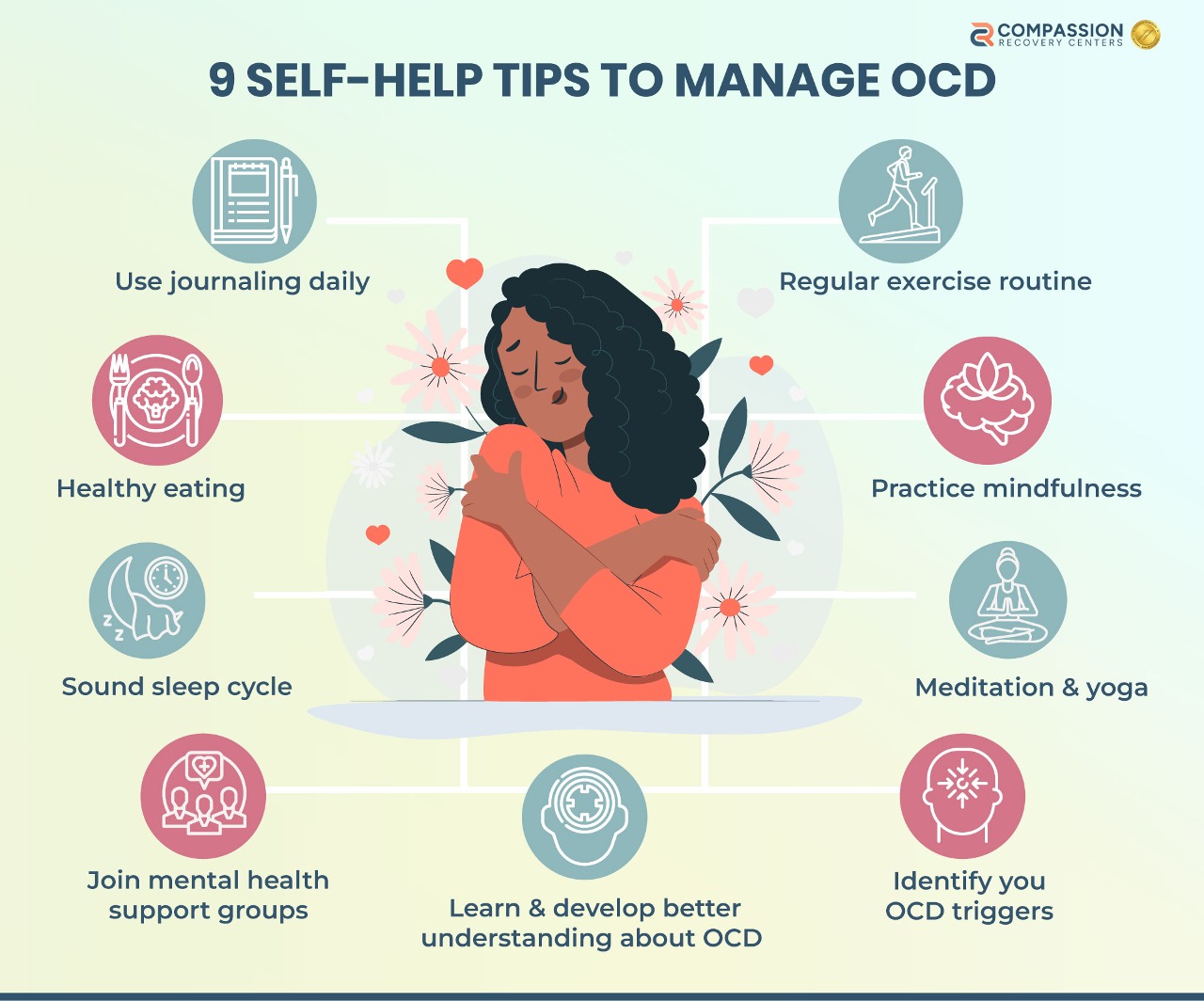With 2-3 million individuals in the US population currently suffering from OCD, it is crucially significant to enhance your understanding of OCD to opt for timely treatment. Therefore, the current article gives a complete overview of:
- The impact of OCD on your life
- OCD-Cycle: 4 stages of OCD
- What are the 4 types of OCD and their respective symptoms
- Role of OCD awareness in better treatment perspectives
- Doctors-approved OCD treatment strategies
- How can CRC help you in the best possible way?
To help you determine your OCD type and seek personalized treatment guidance, consult Compassion Recovery Centers (CRC) today by calling (877) 414-3007 or filling out our confidential contact form.
What OCD Feels Like? Decode the OCD Cycle
Obsessive-compulsive disorder (OCD) is considered one of the most distressing mental health disorders, featuring unwanted psychological obsessions and persistent compulsions. The prominent consequences of having OCD include:
- Low self-esteem
- Persistent doubts and negative thoughts
- Lack of focus and attention
- Maximum time wastage
- Lack of social and interpersonal skills
- Adversely affected relationships
- Poor academic life
- Disturbed professional career
Recognize the Key Stages of OCD
Driven by severe anxiety and a strong desire to find relief, the OCD cycle consists of the following 4 stages:
- Obsession over a specific thought
- Resulting anxiety
- A compulsion to do something to counteract the anxiety
- Temporary relief
The vicious cycle of obsessions and compulsions profoundly affects an individual suffering from OCD in the form of inducing different symptoms. A variety of distinct symptoms appear in the 4 types of OCD.

What Are the 4 Types of OCD? Uncover Your OCD Type
Considering the diverse variety of obsessions and compulsions faced by the affected individuals struggling with OCD, the categorization of OCD into four distinct types helps in developing a better understanding of varying OCD symptoms. The four types of OCD have been briefed below:
Type 1 – The OC-Pair of Contamination & Cleaning
In this type of OCD, you will face a strong urge to clean, wash, and bathe more frequently than normal. This compulsion is fundamentally driven by obsessive thoughts of catching an infection and constant fear of contamination with germs and dirt.
The severe symptoms of type 1 OCD include:
- Continuous hand washing leads to bleeding
- Excessive usage of bleaches and cleaning agents to get rid of germs
- Inability to touch objects in public places due to fear of contamination
Type 2 – Intrusive Doubts Leading to Repetitive Double-Checking
Doubt is an elementary symptom found in individuals struggling with obsessive-compulsive disorder. They lack confidence in their memory, leading to repetitive actions involving cross-checking repeatedly. Such compulsions take much time in their routine as they never feel fully satisfied. Some of the most common symptoms include:
- Consistent checking of door locks, etc.
- The constant fear of causing harm to self and others by any act of negligence
- Checking the switches of electric and gas appliances again and again
- Worrying about having anything lost, misplaced, or damaged
Type 3 – Consistent Need of Symmetry & Ordering
The desire to get everything in your surroundings in proper order and perfect symmetry is also called “Just Right OCD“. Individuals suffering from this type of OCD have a constant urge to yield perfectionism. The frequently occurring signs and symptoms of type 3 OCD are:
- Keep changing the arrangements of surrounding objects until it feel picture-perfect.
- Obsession with doing things for a particular number of times that is specific to their intrusive thoughts
- Repetitive counting of things
- Over-memorization of symmetry of certain things
Type 4 – Obsessing Over Unwanted Taboo Thoughts
This type 4 OCD primarily revolves around unacceptable taboo thoughts that violate one’s religious, social, and moral values. The constant feeling of guilt and shame damages the self-esteem and consciousness of the affected individuals. This obsession has been considered to be more dangerous as compared to that of other OCD types, as it may lead to blasphemous or sexual crimes. Its prominent symptoms refer to:
- Constant urge to suppress violent thoughts
- Avoiding social gatherings to prevent facing triggering situations
- Doubting the relationships
- Consistently questioning religious identity
- Worrying about harming self or others
Get your question answered now.
Paving the Way to Recovery: The Importance of OCD Education in Treatment
With the right kind of awareness about the occurrence and progression of OCD, you can achieve better treatment efficacy. According to a research study, it has been observed that lack of knowledge about OCD symptoms causes delays in treatment. It particularly affects the treatment duration accompanied by less positive outcomes, unlike early intervention.
According to the International OCD Foundation, a majority of people who take proper treatment followed by OCD diagnosis experienced substantial improvement in their symptoms. Some of the facts stated include:
- Around 40-60% improvement has been observed in individuals taking the medications for treating OCD.
- In the case of affected people taking suitable OCD therapies, nearly 60-80% symptomatic improvement has been proven.
Therefore, it is crucially important to have a good understanding of obsessive-compulsive disorder to ensure an enhanced treatment prognosis.
Doctors-Approved Strategies to Recover from OCD
The generally employed OCD treatment strategy involves a personalized combination of FDA-approved medication and suitable OCD therapies. Depending on the severity of the disease and co-occurrence of any comorbidities, medications may vary from person to person. However, the most frequently used and FDA-approved OCD medications are:
- Clomipramine
- Citalopram
- Escitalopram
- Fluoxetine
- Fluvoxamine
- Paroxetine
- Sertraline
Top OCD Therapies You Should Know
The psychological treatment has a great significance in the OCD treatment. The most effective therapies used to manage the OCD symptoms include:
- Cognitive-behavioral therapy (CBT)
- Exposure and response prevention (ERP) therapy
- Imaginal exposure or visualization therapy
- Habit reversal training
Nonetheless, every individual struggling with OCD has his own needs, varying with the OCD types. Therefore, it is essential to consult certified mental health professionals to get a highly customized treatment plan.
Transforming OCD Management: The Essential Role of Compassion Recovery Centers
If you are still wondering whether your symptoms belong to which type of OCD, the Compassion Recovery Centers (CRC) will provide you with detailed consultation and guidance in this regard. The skillful and highly qualified staff, comprising a certified team of mental health professionals, are adept at helping you recover from your distressing symptoms utterly compassionately.
To prioritize your comfort and safety, CRC offers diverse treatment options, such as:
- Partial Hospitalization Program (PHP)
- Intensive Outpatient Program (IOP)
- Outpatient Program (OP)
- Virtual IOP
- Dual Diagnosis
Moreover, you can also opt for a suitable insurance program (AETNA, ANTHEM, BLUE SHIELD, CIGNA, UNITED HEALTHCARE, and many more) for your customized treatment plan.
Frequently Asked Questions While Recognizing the 4 Types of OCD
Here, you can get some of the most common queries answered to enhance your understanding of obsessive-compulsive disorder (OCD):
What is the Most Common OCD Type?
The OCD type associated with contamination obsessions is found to be the most common OCD type (46%).
At What Age Does OCD Start?
OCD may start at either 8-12 years of age or within the span of late adolescent years and early adulthood stage.
Does OCD Affect Memory?
Obsessive-compulsive disorder (OCD) may affect memory as one of its symptoms includes memory hoarding that reflects over-memorization of certain incidents. The individuals affected by OCD feel the strong urge to keep remembering the particular details that they think might be useful for them in the future to prevent any worse circumstances.
Resources
1) Who Gets OCD? OCD International Foundation. Retrieved on July 25, 2024. Available at: https://iocdf.org/about-ocd/who-gets-ocd/#:~:text=Although%20OCD%20can%20occur%20at,teen%20years%20and%20early%20adulthood.
2) Sunde, T., Johnson, S. U., Himle, J. A., Bertelsen, T. B., Haaland, V. Ø., Vogel, P. A., … & Haaland, Å. T. (2021). Metacognitions and obsessive beliefs in obsessive–compulsive disorder: A study of within-and between-person effects on long-term outcome. Cognitive Therapy and Research, 1-15. Available at:
https://link.springer.com/article/10.1007/s10608-021-10210-y
3) “Just Right” OCD Symptoms. International OCD Foundation. Retrieved on July 26, 2024. Available at:
https://iocdf.org/wp-content/uploads/2014/10/Just-right-OCD-Fact-Sheet.pdf
4) What Are the 4 Main Types of Obsessive-Compulsive Disorder (OCD)?. GoodRx Health. Retrieved on July 26, 2024. Available at:
https://www.goodrx.com/conditions/obsessive-compulsive-disorder/different-types-of-ocd
5) Treatments for OCD. Anxiety and Depression Association of America (ADAA). Retrieved on July 26, 2024. Available at:
https://adaa.org/understanding-anxiety/obsessive-compulsive-disorder-ocd/treatments-for-ocd
6) Canavan, R. (2020). Where do we stand with OCD: Psychotherapists recognition of, and treatment recommendations for, individuals presenting with taboo intrusive thoughts (Doctoral dissertation, Dublin Business School). Available at:
https://esource.dbs.ie/server/api/core/bitstreams/07ed7d60-4d93-4b58-a9f1-546c6ca8be08/content
7) Medication, therapy and now surgery offer hope for severe obsessive compulsive disorder. At The Forefront: UChicago Medicine. Retrieved on July 25, 2024. Available at: https://www.uchicagomedicine.org/forefront/neurosciences-articles/2018/november/medication-therapy-and-now-surgery-offer-hope-for-severe-obsessive-compulsive-disorder
8) Guazzini, A., Gursesli, M. C., Serritella, E., Tani, M., & Duradoni, M. (2022). Obsessive-compulsive disorder (OCD) types and social media: are social media important and impactful for OCD people?. European journal of investigation in health, psychology and education, 12(8), 1108-1120. Available at:
https://www.ncbi.nlm.nih.gov/pmc/articles/PMC9407245/
9) Aminabee, S., Jayashree, D. D., & Rao, A. L. (2020). Obsessive Compulsive Disorder and Its Care-Review. International Journal of Research in Pharmacy and Chemistry, 10, 105-110. Available at: https://www.researchgate.net/profile/Shaik-Aminabee/publication/338994904_OBSESSIVE_COMPULSIVE_DISORDER_AND_ITS_CARE-REVIEW/links/62125c266c472329dcf8d3d5/OBSESSIVE-COMPULSIVE-DISORDER-AND-ITS-CARE-REVIEW.pdf
10) Medication for OCD. OCD UK. Retrieved on July 26, 2024. Available at: https://www.ocduk.org/overcoming-ocd/medication/
11) Kalenzaga, S., Clarys, D., & Jaafari, N. (2020). The memory deficit hypothesis of compulsive checking in OCD: What are we really talking about? A narrative review. Memory, 28(8), 1089-1103. Available at:
https://www.tandfonline.com/doi/abs/10.1080/09658211.2020.1811875
12) Jalal, B., Chamberlain, S. R., Robbins, T. W., & Sahakian, B. J. (2022). Obsessive–compulsive disorder—contamination fears, features, and treatment: novel smartphone therapies in light of global mental health and pandemics (COVID-19). CNS spectrums, 27(2), 136-144. Available at:
https://www.ncbi.nlm.nih.gov/pmc/articles/PMC7691644/#ref10
13) Compulsions – OCD. OCD UK. Retrieved on July 26, 2024. Available at:
https://www.ocduk.org/ocd/compulsions/
14) Thompson, E. M., Torres, A. R., Albertella, L., Ferrão, Y. A., Tiego, J., Shavitt, R. G., … & Fontenelle, L. F. (2020). The speed of progression towards obsessive-compulsive disorder. Journal of affective disorders, 264, 181-186. Available at: https://www.sciencedirect.com/science/article/abs/pii/S0165032719316593
What is the Hardest Form of OCD?
The obsessive fear of contamination and repetitive compulsion for cleanliness is considered the hardest form of OCD, as it can ruin an individual’s personal and professional life. The affected people tend to spend hours washing and showering, and in severe cases, some do not even step out of their houses for fear of germ contamination.
Did You Know? According to WHO, one out of every seven teens is struggling with some sort of mental illness.









